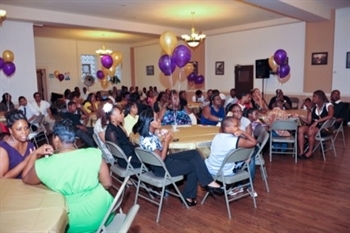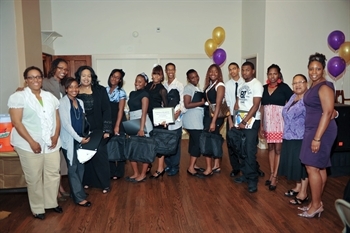Digital Youth Summer Jobs graduates inaugural class
Carl Vogel
Published: October 6, 2010

Beloved Community Family Services honors Englewood youth for completing summer programs
Jermaine Johnson
For the dozen teens gathered in the community room at Beloved Community Christian Church, the Youth Recognition Ceremony was yet another group activity focusing on their capacity to learn and grow. As participants in the Englewood cluster of the Digital Youth Summer Jobs (DYSJ) program, the students had spent the last eight weeks working together and individually to explore technology career options.
DYSJ provided an opportunity for youth in the five Chicago Smart Communities (Englewood, Auburn Gresham, Chicago Lawn, Pilsen and Humboldt Park) to obtain work experience through internship opportunities at businesses, governmental agencies and not-for-profit organizations in technology-related fields. In Englewood, the twelve students all participated in a program at Columbia College that included everything from building a model skyscraper to building a personal web page.
The students also attended weekly sessions at Beloved Community Family Services, learning “digital life” trainings from Common Sense Media, taking college tours, and getting up to speed on crucial job readiness skills such as resume writing and interviewing. Sponsored by Local Initiatives Support Corporation (LISC)/Chicago, in partnership with the City of Chicago and the Smart Communities partner organizations, the DYSJ program served 60 youth between 14 and 17 years old.
With the inaugural year of the DYSJ program completed just a week before, the students, their families, instructors and guests came together at the recognition ceremony at Beloved Community with other participants in youth programs in Englewood on September 1. Each DYSJ student was presented a certificate of completion and earned a MacBook computer for their work and for perfect attendance.
“I challenge you to recognize you can achieve all things,” said Tammy Taylor, Englewood’s DYSJ program manager for Beloved Community Family Services. “It’s not where you come from, it’s where you’re going that matters.”

Staff and students of the Digital Summer Youth Jobs program in Englewood
Jermaine Johnson
Many Exciting Internships
In each of the four other Smart Communities a similar ceremony took place, marking the completion of a busy, educational summer. In Pilsen, for example, 12 students participated in the program, which culminated with a recognition ceremony at Dvorak Park in late August.
In Humboldt Park, some students worked with the Westside Writing Project, some went downtown to intern at Webitects, a web design firm, and others wrote, staged, recorded and edited short public-service announcements about nutrition, exercise and diabetes. “My mom is diabetic. Now I have a better idea how I can help her,” says Richard Pagan, one of the participants.
In Auburn Gresham, Jermaine Martin worked at the Greater Auburn Gresham Development Corporation, where he interviewed representatives from the New Pisgah Community Service Organization about their first comprehensive health fair and took digital photos at the event. Nonie Brown interned at local tech start up Blue Ocean Logic for the summer—and they liked her work so much they asked her to keep working part-time after the program was finished. In fact, three of the Auburn Gresham participants will keep working at their internships this fall.
And in Chicago Lawn, Annissa Taylor, a senior at CICS-Longwood High School, learned about the business of The Health Food Store on Western Avenue near 63rd Street, then made software recommendations to build a customer database and helped the owner do more of her ordering online. At Primerica, three interns spent the summer digitizing paper files, doing client relations, and designing bilingual, branded calendars, flyers and other promotional items.
Tina James, the business resource coordinator for the Greater Southwest Development Corporation, who coordinated Digital Youth Summer Jobs in Chicago Lawn, summed up the purpose of the program at the community graduation ceremony: “If we seriously want to invest in our children, we need to have more cutting-edge opportunities available to them.”
A Great Start for Smart Communities
The Digital Youth Summer Jobs program is one of the first programs to be launched for the Smart Communities program, and it provided an opportunity to learn more about how to best connect neighborhood residents and institutions to digital technology.
“The youth were more tech savvy than we might have thought before we started. If you put a piece of digital equipment in front of them, they’ll know how to work with it or quickly figure it out,” says Dionne Baux, the program officer for Smart Communities at LISC. “But we also found that, especially among the younger kids, they’re more knowledgeable about social networking than how to get the most out of digital tools like Microsoft Word or Excel.”
That kind of information—and the relationships that were built with local schools and families—is invaluable as the work is now underway to launch a new Smart Communities program later this school year: The Digital Youth Network, a program tailored to 6th – 8th graders at a middle-school in each of the five neighborhoods. A year-long afterschool program, the DYN will help a cohort of students to learn more about using and creating digital media.
At the same time, LISC and the community partner organizations are already thinking about how to be sure that next year’s Digital Youth Summer Jobs program will be as successful. An online survey was sent to the more than 30 businesses and nonprofits that offered internships, asking about the experience and how to improve it, for example. But Baux says that, although continuous improvement is always a goal, if next year’s crop of students learn as much as this year’s graduating class, DYSN will once again be a wonderful opportunity.
“I think everyone agrees that the DYSJ program was really a great success,” Baux says. “The students were exposed to so much and learned a lot, and now their families are aware of all that’s going on with Smart Communities, and that’s a great step for our programs.”
Additional reporting for this article by Demond Drummer, Ernest Sanders and Christy Prahl.